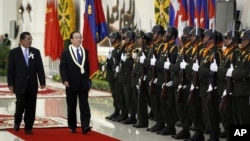WASHINGTON DC - As US congressional representatives in the House and Senate discuss a potential cut in US aid to Cambodia, analysts say that China’s increasing role in Cambodia’s development cannot be ignored.
Currently, a resolution is moving through the Senate that would urge the US government to tie at least some Cambodian aid to whether the upcoming elections are free and fair. Last week, a House of Representatives subcommittee held hearings on Cambodia’s political and social “crisis,” where House representatives also said the US should consider cutting back some aid to Cambodia.
But experts say the withdrawal of US aid is a tricky matter. That’s because the US is seeking more support across Asia, in the midst of widening Chinese influence in the region.
“There is no doubt that China’s continued massive aid to Cambodia plays a key role in assuring the current regime’s survival,” Shihoko Goto, a researcher of Asian affairs at the Woodrow Wilson International Center for Scholars, in Washington, told VOA Khmer recently. In the longer-term, it is in Cambodia’s interest “to have financial support beyond China,” she said.
As the US rebalances its diplomatic efforts toward Asia, China’s policies toward Cambodia should be a consideration, she said. But it is too simple to argue that the US “has more to lose should it take principled policy measures toward Phnom Penh.”
“Granted, US aid to Cambodia pales in comparison to that by China,” she said. “Nonetheless, aid cuts from the United States would not only have an economic impact, but it would also hurt the country’s public image as well. That in turn could hurt Cambodia’s exports and harm longer-tern economic growth prospects.”
To develop, Cambodia has to diversify its economic base, and that means having many different partners, she said.
“In order to have such diversification, it needs to be embraced by the international community and look to building a competitive economic base,” she said. “Holding free and fair elections is one step toward meeting that longer-term goal.”
The issue of free and fair elections has come to the fore in the run-up to Election Day, July 28. US senators and congressmen have called on these reforms, as have UN officials, rights groups and local election monitors.
John Ciorciari, a professor of public policy at the University of Michigan, told VOA Khmer that the increased criticism of the Cambodian government as the election approaches has an affect on US President Barack Obama.
“The Obama administration’s strategy of engagement with Cambodia is under increasing pressure,” he said. “For years, key members and staff in the US Congress have favored sanctions against the Hun Sen government, and the most recent Republican proposals to cut aid don’t appear to be idle threats. If the election is marred by evidence of fraud or intimidation, the bills’ sponsors will likely push forward, and if they can attract a small number of Senate Democrats concerned about human rights, they may succeed in suspending direct aid, as Congress has done in the past.”
For Cambodia, that would mean the loss of social programs and could hurt the country’s efforts to attract more investment and donor support, he said.
“I’m confident that the Cambodian government does care about the US threat,” Ciorciari said. “Many governments, including Cambodia’s, dismiss Western threats to reduce aid by saying they will turn to China. But small developing states seldom want to be too dependent on any single foreign power, including China. The CPP wants to win the election, but it would surely prefer not to lose US aid in the process.”
That said, if Cambodia does lose US aid, it would likely look more to China for assistance, Ciorciari said. “That would be a setback for the Obama administration’s regional strategy of building influence through engagement. If the election is marred by clear intimidation or fraud, that may be a price worth paying, but cutting direct aid shouldn’t be a step taken lightly. A tough form of engagement remains the best US strategy in Cambodia.”
John Sifton, advocacy director for Human Rights Watch, said that many in the US government are becoming more and more concerned about Cambodia, especially following Obama’s visit to the country last year, when he attended a regional summit.
“Most members of Congress, most members of the State Department, and everybody in the White House is tired of the situation in Cambodia,” he said. “And I think that there needs to be a new policy.”
That could mean cutting all assistance, cutting military assistance, cutting lending through the Asian Development Bank, “and other things like that,” he said. “The United States government wants a new policy toward Cambodia. And after 21 years, that makes sense. After 21 years of sitting and watching Hun Sen accrue more power, it’s clear that the policy has failed… and that a new policy is necessary.”
In Aid Debates, Experts Factor China’s Role
- Sok Khemara
- VOA Khmer







